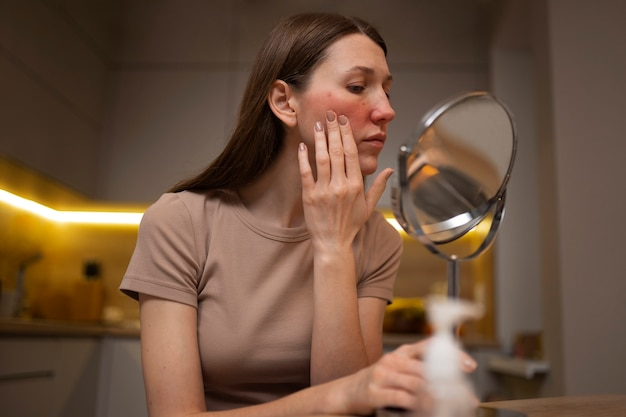Beauty from Within: Understanding the Link Between Diet and Skin Health
In our pursuit of radiant skin and timeless beauty, we often focus on external factors such as skincare products and treatments. However, we tend to overlook an essential aspect of achieving healthy and glowing skin: our diet. The link between diet and skin health is a powerful and often underestimated connection. The foods we consume play a vital role in nourishing our skin from within and can significantly impact its appearance and overall health. In this blog, we will delve into the profound relationship between diet and skin health, exploring how the nutrients we consume can contribute to our beauty from within.

The Importance of Skin Health
Skin health is not merely about aesthetics; it encompasses the overall well-being and vitality of our largest organ. Our skin acts as a protective barrier, shielding us from external pollutants, harmful UV rays, and infections. It regulates body temperature and plays a crucial role in the elimination of waste through sweat. Skin health is also closely linked to our emotional well-being, as it affects our self-confidence and self-esteem.
Diet and Skin Health
Our diet has a profound impact on the health of our skin. By consuming a balanced and nutrient-rich diet, we can provide our skin with the essential building blocks it needs to function optimally. Let’s delve into the key nutrients that promote skin health and radiance.
Antioxidants: These powerful compounds combat oxidative stress caused by free radicals, which can damage skin cells and accelerate aging. Foods rich in antioxidants, such as berries, citrus fruits, leafy greens, and green tea, help neutralize free radicals and promote a youthful complexion.
Omega-3 Fatty Acids: These healthy fats found in fatty fish, chia seeds, and walnuts have anti-inflammatory properties, reducing skin redness and inflammation. Omega-3 fatty acids also help maintain the integrity of the skin barrier, preventing moisture loss and enhancing skin hydration.
Vitamins and Minerals: Adequate intake of vitamins and minerals is crucial for skin health. Vitamin C promotes collagen production and helps fade scars and blemishes, while vitamin E nourishes the skin and protects it from sun damage. Additionally, zinc supports skin healing, and selenium acts as a potent antioxidant. Include a variety of fruits, vegetables, nuts, and whole grains in your diet to ensure an ample supply of these essential nutrients.
Hydration: While not directly a part of our diet, proper hydration is vital for maintaining skin health. Drinking an adequate amount of water keeps our skin hydrated, plump, and supple. Hydrated skin is less prone to dryness, wrinkles, and other signs of aging.
Beauty and Diet: The Connection
The connection between beauty and diet goes beyond skin health alone. Our skin reflects the overall state of our body’s health and well-being. A nutrient-rich diet helps improve blood circulation, ensuring that oxygen and nutrients are efficiently delivered to the skin cells. This enhanced circulation results in a healthy glow and improved complexion.
Furthermore, a balanced diet can help manage skin conditions such as acne, eczema, and psoriasis. Certain foods can trigger inflammation and exacerbate these conditions, while others possess anti-inflammatory properties that can alleviate symptoms. Understanding and identifying potential food triggers can aid in managing these skin concerns.
Nutrition and Skin: Achieving Optimal Results
To maximize the benefits of a healthy diet on your skin, consider the following tips:
-
- Focus on consuming a balanced diet consisting of whole foods, including fruits, vegetables, lean proteins, healthy fats, and whole grains. Aim for a colorful plate, incorporating a variety of nutrients.
-
- Highly processed foods often contain additives, preservatives, and unhealthy fats, which can promote inflammation and negatively impact skin health. Opt for whole, natural foods whenever possible.
-
- While obtaining nutrients from whole foods is ideal, certain supplements can complement your diet. Consult a healthcare professional or a registered dietitian to determine if supplementation is necessary for you.
-
- Consistency is key when it comes to reaping the benefits of a healthy diet for your skin. Incorporate nutritious foods into your daily routine and maintain a long-term commitment to your dietary choices.
The Link between Diet and Skin Health
The link between diet and skin health is undeniable. What we consume directly affects the appearance and vitality of our skin. Consuming a nutrient-rich diet provides our skin with the essential building blocks it needs to function optimally. By incorporating specific foods into our diet, we can nourish our skin from within and enhance its natural beauty.
Diet for Glowing Skin
Achieving glowing skin starts with making conscious choices about what we eat. Including a variety of fruits and vegetables in our diet is crucial, as they are rich in vitamins, minerals, and antioxidants. These nutrients help protect our skin from damage caused by free radicals, promote collagen production, and maintain a youthful complexion.
Eating for Skin Health
To nourish your skin from within, it’s important to focus on specific nutrients that benefit skin health. Incorporate the following into your diet:
-
- Antioxidant-Rich Foods
-
- Essential Fatty Acids
-
- Vitamins and Minerals
Nourishing Skin from Within
Nourishing your skin from within involves adopting a holistic approach to your diet and lifestyle. Here are some additional tips to enhance your skin health:
-
- Drink plenty of water to keep your skin hydrated. Water helps flush out toxins, improves skin elasticity, and promotes a youthful glow. Aim for at least 8 glasses of water per day.
-
- Highly processed foods are often high in sugar, unhealthy fats, and additives, which can contribute to inflammation and skin issues. Opt for whole, natural foods to provide your skin with the nutrients it needs.
-
- Practice balance and moderation in your diet. Avoid extreme fad diets, as they may deprive your skin of essential nutrients. Instead, focus on a well-rounded, nutrient-dense eating plan that includes a variety of food groups.
Foods for Healthy Skin
Choosing the right foods for healthy skin is essential. Incorporating a variety of nutrient-dense foods can provide your skin with the necessary vitamins, minerals, and antioxidants it needs to thrive. Let’s explore some of the best foods for skin health:
-
- Fruits and Vegetables: Colorful fruits and vegetables, such as berries, citrus fruits, leafy greens, and bell peppers, are rich in antioxidants. These powerful compounds help protect the skin from damage caused by free radicals and promote a clear and youthful complexion.
-
- Healthy Fats: Foods rich in healthy fats, such as avocados, nuts, seeds, and fatty fish like salmon, provide essential fatty acids that support skin health. These fats help maintain the skin’s moisture barrier, promote elasticity, and reduce inflammation, leading to clearer and smoother skin.
-
- Whole Grains: Opt for whole grains like quinoa, brown rice, and whole wheat bread, as they contain vitamins, minerals, and fiber that support overall skin health. These foods have a lower glycemic index, reducing the risk of breakouts and promoting a balanced complexion.
-
- Lean Proteins: Incorporate lean sources of protein, such as poultry, fish, tofu, and legumes, into your diet. Protein is essential for collagen production, which helps keep the skin firm and supple.
-
- Water: While not a food, proper hydration is crucial for skin health. Drinking an adequate amount of water helps maintain skin moisture, flush out toxins, and promote a clearer complexion.
Skin-Friendly Diet
Adopting a skin-friendly diet involves making conscious choices about the foods you consume on a regular basis. Here are some key principles to keep in mind:
-
- Balanced Nutrition
-
- Minimize Processed Foods
-
- Limit Sugar and Refined Carbohydrates
-
- Practice Portion Control
Diet for Clear Skin
Maintaining clear skin involves avoiding potential triggers and incorporating beneficial foods into your diet. Some additional tips for a diet that promotes clear skin include:
-
- Certain foods can trigger skin issues in susceptible individuals. Pay attention to your body’s response to specific foods and consider eliminating or reducing them if you suspect a sensitivity.
-
- Include foods with anti-inflammatory properties, such as turmeric, ginger, and green tea, in your diet. These foods can help reduce inflammation and promote clearer skin.
-
- Incorporate probiotic-rich foods like yogurt, sauerkraut, and kefir into your diet. Probiotics support a healthy gut microbiome, which plays a role in skin health.
Benefits of Diet for Skin Health
The benefits of a healthy diet for skin health are numerous. Nourishing your body with the right nutrients through your diet can significantly impact the appearance and vitality of your skin. Let’s explore the key advantages:
-
- A nutrient-rich diet can contribute to a radiant and glowing complexion. When you provide your body with a variety of vitamins, minerals, and antioxidants through your diet, it helps nourish your skin cells, promote collagen production, and combat oxidative stress, resulting in a healthy and vibrant glow.
-
- A well-balanced diet can also improve skin texture. Foods rich in omega-3 fatty acids, such as fatty fish, flaxseeds, and walnuts, help maintain the skin’s moisture barrier, keeping it supple and preventing dryness. Additionally, vitamins like vitamin E promote skin elasticity, making your skin feel smoother and more youthful.
-
- Chronic inflammation can contribute to skin conditions like acne, eczema, and psoriasis. A diet rich in anti-inflammatory foods, such as fruits, vegetables, whole grains, and spices like turmeric and ginger, can help reduce inflammation and alleviate symptoms of these skin conditions.
-
- Aging is a natural part of life, but certain dietary choices can slow down the aging process. Antioxidant-rich foods, such as berries, dark chocolate, and green tea, help neutralize free radicals and protect your skin from damage caused by environmental factors, ultimately minimizing the appearance of fine lines and wrinkles.
Diet and Skincare Routine
Incorporating a skin-friendly diet into your skincare routine can enhance the results of your external skincare efforts. Here’s how to combine the two for optimal skin health:
-
- Hydration plays a vital role in both your diet and skincare routine. Drink plenty of water to keep your body and skin well-hydrated. Moisturized skin appears plump, healthy, and more youthful.
-
- Include a wide variety of nutrient-packed foods in your diet. Focus on fruits, vegetables, lean proteins, whole grains, and healthy fats. These foods provide essential vitamins, minerals, and antioxidants that nourish your skin from within.
-
- Pair your nutrient-rich diet with antioxidant-rich skincare products. Look for serums, creams, and oils containing ingredients like vitamin C, vitamin E, and green tea extract. This combination helps protect your skin from free radicals, enhances collagen production, and promotes a youthful complexion.
-
- Consistency is key when it comes to both your diet and skincare routine. Make healthy eating choices a habit, and follow a regular skincare regimen to maintain long-term skin health.
Role of Nutrition in Skin Health
Nutrition plays a crucial role in maintaining overall skin health. Here are some key points to consider:
-
- Adequate intake of vitamins and minerals is essential for healthy skin. Vitamin C promotes collagen synthesis, vitamin E protects against oxidative damage, and minerals like zinc support skin healing. Incorporate a variety of fruits, vegetables, nuts, and seeds into your diet to ensure a well-rounded nutrient intake.
-
- Healthy fats, such as omega-3 fatty acids, are crucial for skin health. They help maintain the skin’s moisture barrier, reduce inflammation, and improve skin elasticity. Include sources like fatty fish, avocados, and nuts in your diet.
-
- A balanced diet that includes a variety of nutrients is key to supporting your skin’s health. Avoid extreme diets that eliminate entire food groups, as they may deprive your body of essential nutrients necessary for optimal skin function.
-
- Every individual’s nutritional needs may vary. Consider consulting with a registered dietitian or healthcare professional to personalize your diet and ensure you meet your specific skin health goals.
Taking a holistic approach to skincare and beauty involves recognizing the importance of nourishing our skin from within. By understanding the link between diet and skin health, we can unlock the secrets to achieving a radiant and healthy complexion. From consuming a balanced diet rich in skin-friendly nutrients to incorporating specific foods known for their skin-enhancing properties, we can harness the power of nutrition to support our skin’s vitality. By embracing the concept of beauty from within, we empower ourselves to make mindful dietary choices and prioritize the health of our skin. Let us remember that a glowing complexion is not solely achieved through external means, but by nourishing our bodies with the right nutrients and embracing a holistic approach to skincare. By fueling our beauty journey with a nutrient-rich diet, we can unlock the full potential of our skin’s natural radiance and attain lasting beauty that emanates from within.




